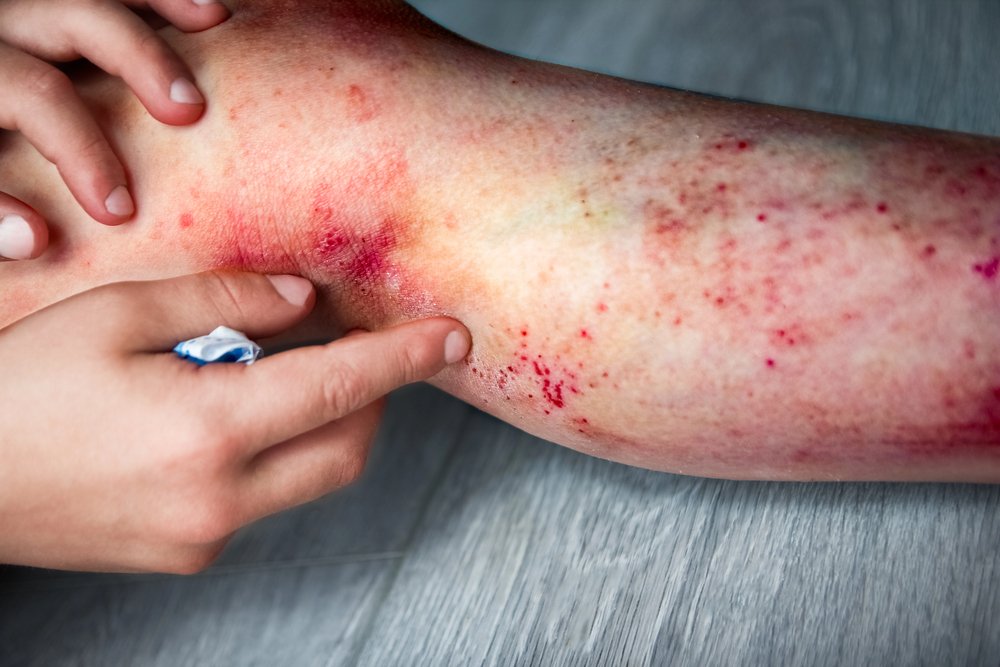Learn
Delve into dermatology diseases with new approaches from conventional to complementary care.
Topics
Explore a broad spectrum of dermatological conditions and topics to enhance your practice.
Training Programs
Expert led instruction for every level of patient care.
Log in to see enrolled program content.
Conferences
Gain practical insights and meet new colleagues.
Hover over a conference to view recordings.
Join Us
The largest integrative dermatology community.
Breastfeeding & Eczema - Can Breast Milk Help Baby Eczema
Breastfeeding is full of nutrients for the baby

Atopic Dermatitis (AD), also known as eczema, is a chronic inflammatory skin disease that affects up to 20% of kids and 3% of adults globally.[1] Many factors may contribute to the development of eczema, including genetics, immune system dysregulation, environmental factors, and abnormal skin barrier function.[2] One question that frequently arises is “what causes eczema in babies?” and if there are any natural remedies or approaches that can reduce the risk for a baby to develop eczema. Researchers have studied whether ingestion of breast milk can impact the risk of developing baby eczema.
What Makes Human Breast Milk Unique?
Infants get vital nutrients from their mother’s breast milk for growth. Breast milk may also influence the development of a child’s immune system, which plays an important role in eczema. What a mother eats can actually change the composition of breast milk, which is an important consideration for infant nutrition.[3] Several research studies have examined whether breastfeeding may prevent the development of AD in offspring.[4,5]
Some Say Breast Milk Prevents Eczema
One study demonstrated that infants who were breastfed for the first four months of life had a lower risk of developing eczema than infants who were fed only cow milk formula.[6] Similarly, babies with a strong family history of eczema who were fed only breast milk for 4 months after birth had a 50% lower risk of developing eczema than babies were fed a cow-milk formula.[7] Another study showed that in mothers without allergic diseases, such as asthma, allergic rhinitis, and eczema, breast milk exposure for over 9 months was associated with lower risk for eczema, compared to breast milk exposure for 0-3 months.[8]
How Breast Milk Alters the Baby’s Microbiome
Breast milk contains a diverse population of beneficial bacteria that is transferred to the baby with breastfeeding. Researchers at the Children’s Hospital Los Angeles demonstrated that babies who were breastfed had a gut microbiome that closely resembled the mother’s breast milk, while babies who were not breastfed had much less diversity of microorganisms in their guts. This underscores the important role of breastfeeding in the development of the infant microbiome.[9] While many questions remain unanswered regarding the connection between the gut microbiome and eczema, it is thought that increased bacterial diversity tends to be a sign of a healthy gut. One way that breastfeeding may be protective against eczema, is that through increased gut microbiome diversity, the infant immune system may be influenced to prevent eczema.[10,11] The exact mechanisms for this phenomenon are still under investigation.
Others Say Breast Milk May Not Help
On the other hand, other researchers have shown that breast milk has no impact at all on whether the babies will develop eczema.[12,13] A few studies even reported an association between breastfeeding and increased risk for eczema.[14,15]
The Bottom Line
There is no clear answer on whether breast milk can help to prevent eczema. The ways that the studies were designed may have influenced the results and led to conflicting evidence. For instance, surveys studies completed by parents about feeding patterns may be inaccurate and unknown compounds in breast milk could also influence eczema risk. Additionally, how often mothers breastfeed their babies and the duration of their breastfeeding sessions could further impact the results but may not have been accounted for in these studies. In other words, more research is still needed to determine whether breast milk is beneficial for eczema.
References
- Nutten S. Atopic dermatitis: global epidemiology and risk factors. Ann Nutr Metab.2015;66 Suppl 1:8-16; PMID: 25925336 Link to research.
- Boguniewicz M, Leung DY. Atopic dermatitis: a disease of altered skin barrier and immune dysregulation. Immunol Rev.2011;242(1):233-246; PMID: 21682749 Link to research.
- Ballard O, Morrow AL. Human milk composition: nutrients and bioactive factors. Pediatr Clin North Am.2013;60(1):49-74; PMID: 23178060 Link to research.
- Dattner AM. Breastfeeding and atopic dermatitis: protective or harmful? facts and controversies. Clin Dermatol.2010;28(1):34-37; PMID: 20082948 Link to research.
- Kramer MS, Kakuma R. Maternal dietary antigen avoidance during pregnancy or lactation, or both, for preventing or treating atopic disease in the child. Cochrane Database Syst Rev.2012;10.1002/14651858.CD000133.pub3(9):CD000133; PMID: 22972039 Link to research.
- Laubereau B, Brockow I, Zirngibl A, et al. Effect of breast-feeding on the development of atopic dermatitis during the first 3 years of life--results from the GINI-birth cohort study. J Pediatr.2004;144(5):602-607; PMID: 15126993 Link to research.
- Schoetzau A, Filipiak-Pittroff B, Franke K, et al. Effect of exclusive breast-feeding and early solid food avoidance on the incidence of atopic dermatitis in high-risk infants at 1 year of age. Pediatr Allergy Immunol.2002;13(4):234-242; PMID: 12390439 Link to research.
- Snijders BE, Thijs C, Dagnelie PC, et al. Breast-feeding duration and infant atopic manifestations, by maternal allergic status, in the first 2 years of life (KOALA study). J Pediatr.2007;151(4):347-351, 351 e341-342; PMID: 17889066 Link to research.
- Pannaraj PS, Li F, Cerini C, et al. Association Between Breast Milk Bacterial Communities and Establishment and Development of the Infant Gut Microbiome. JAMA Pediatr.2017;171(7):647-654; PMID: 28492938 Link to research.
- Sitarik AR, Bobbitt KR, Havstad SL, et al. Breast Milk Transforming Growth Factor beta Is Associated With Neonatal Gut Microbial Composition. J Pediatr Gastroenterol Nutr.2017;65(3):e60-e67; PMID: 28827481 Link to research.
- Munblit D, Peroni DG, Boix-Amoros A, et al. Human Milk and Allergic Diseases: An Unsolved Puzzle. Nutrients.2017;9(8)PMID: 28817095 Link to research.
- Miyake Y, Tanaka K, Sasaki S, et al. Breastfeeding and atopic eczema in Japanese infants: The Osaka Maternal and Child Health Study. Pediatr Allergy Immunol.2009;20(3):234-241; PMID: 19438982 Link to research.
- Benn CS, Wohlfahrt J, Aaby P, et al. Breastfeeding and risk of atopic dermatitis, by parental history of allergy, during the first 18 months of life. Am J Epidemiol.2004;160(3):217-223; PMID: 15257994 Link to research.
- Miyake Y, Yura A, Iki M. Breastfeeding and the prevalence of symptoms of allergic disorders in Japanese adolescents. Clin Exp Allergy.2003;33(3):312-316; PMID: 12614444 Link to research.
- Bergmann RL, Diepgen TL, Kuss O, et al. Breastfeeding duration is a risk factor for atopic eczema. Clin Exp Allergy.2002;32(2):205-209; PMID: 11929483 Link to research.
Related Articles

Atopic Dermatitis
Atopic Dermatitis Case Discussion with Dr. Peter Lio

Atopic Dermatitis
Navigating the Complexities of Atopic Dermatitis and Prurigo Nodularis: A Clinical Toolkit for Practitioners

Atopic Dermatitis
Navigating Atopic Dermatitis and Hand & Foot Dermatitis




